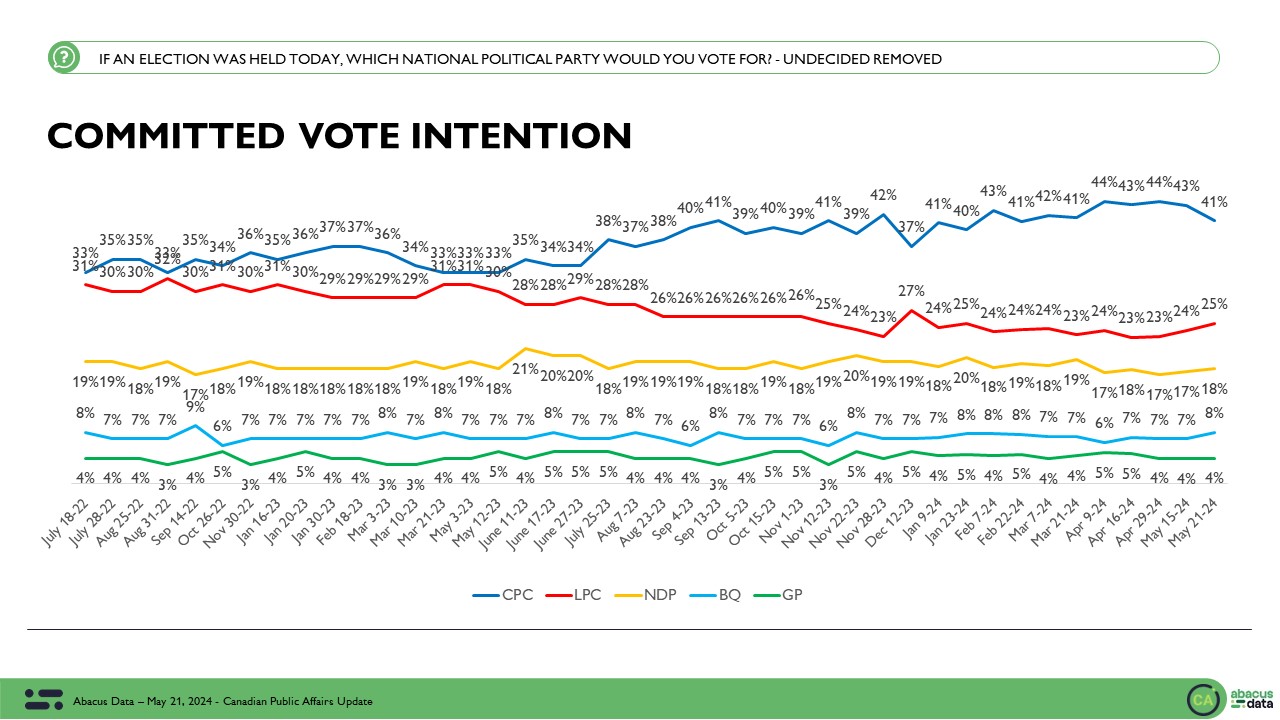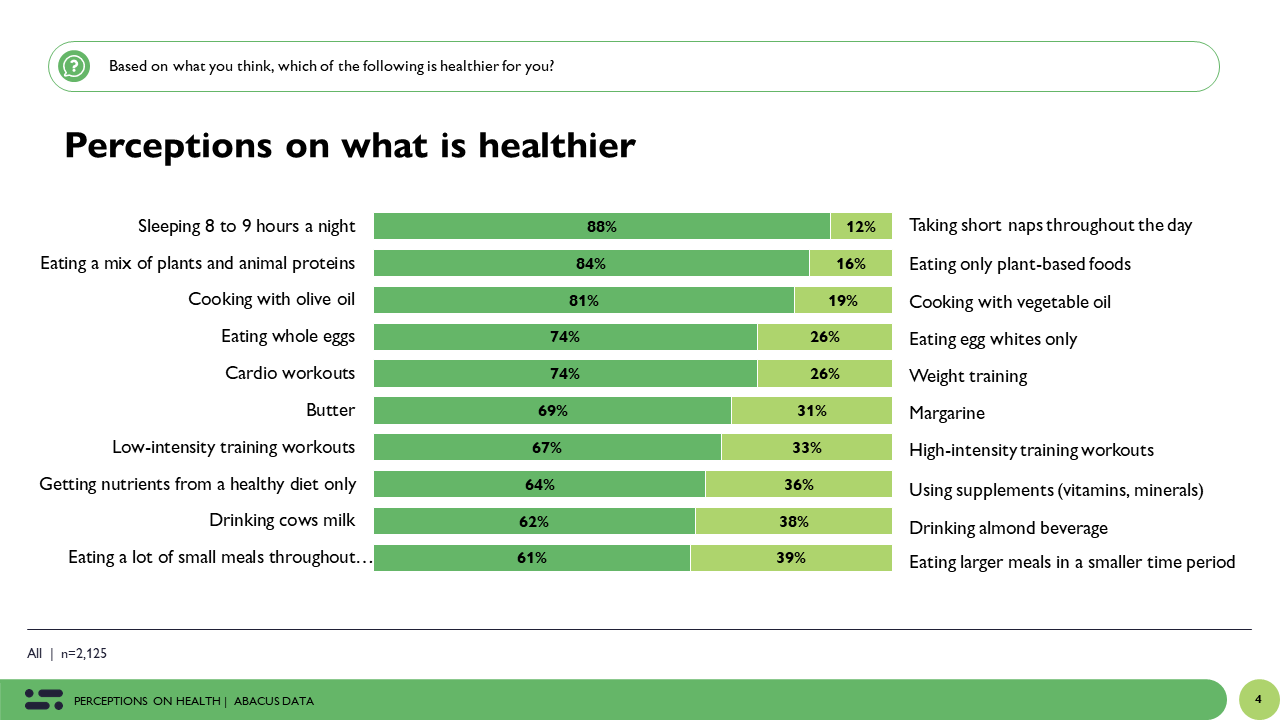Federal Conservatives lead by 18 in British Columbia
May 17, 2024
From May 6 to 9, 2024, Abacus Data conducted a survey of 1,000 eligible voters in British Columbia exploring their views on federal politics and government as part of a larger survey. A few days ago we released results on views towards provincial politics.
The federal Conservatives lead by a significant margin in British Columbia. The Conservative Party has the support of 44% of committed voters, 18 points ahead of the NDP, in second place, and 26 points ahead the Liberal Party, in third place. The Greens placed in fourth with 8% of committed voters. In comparison with the 2021 election results this represents an 11-point gain for the Conservatives, a 3-point gain for both the NDP and the Greens, and a 9-point drop for the Liberals.
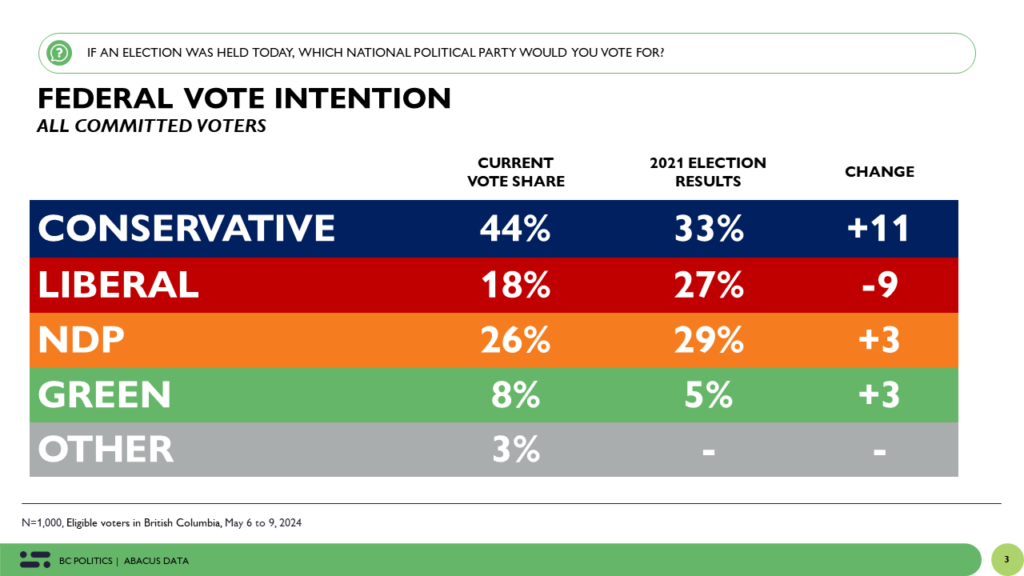
Among those who identified as Liberal voters in the 2021 election and were asked about their current voting intentions, 62% expressed that they would vote for the Liberal party again if the election were held at the time of the survey. In contrast, 95% of those who identified as Conservative voters expressed their intent to vote for the Conservative Party again, while 78% of self-identified NDP supporters stated they would do the same.
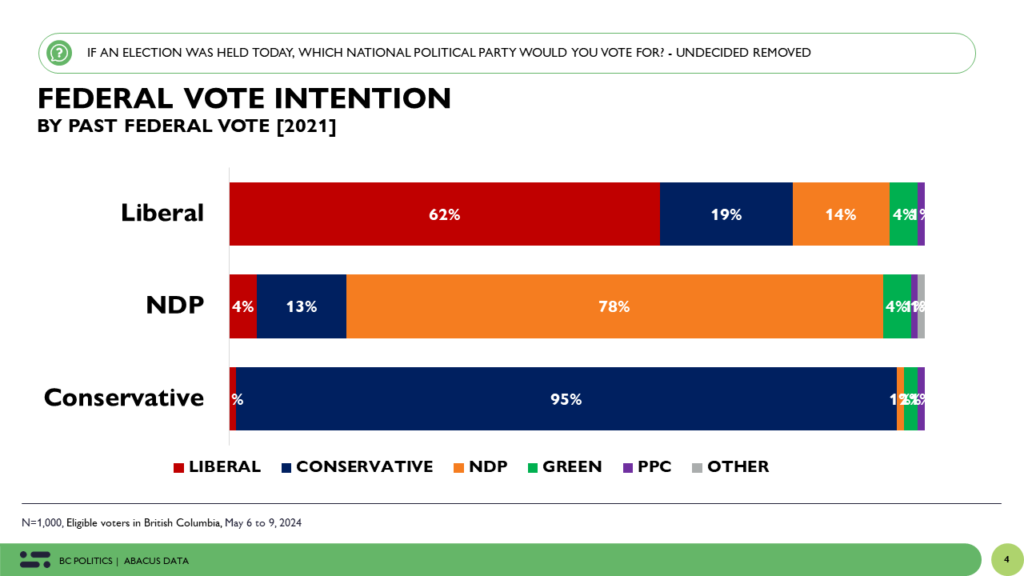
The Conservatives also lead in both Metro Vancouver and Interior/Northern BC, with the support of 46% in both regions. In Vancouver Island, the NDP is slightly ahead of the Conservatives by 2 points, and well ahead of the Liberals by 25 points.
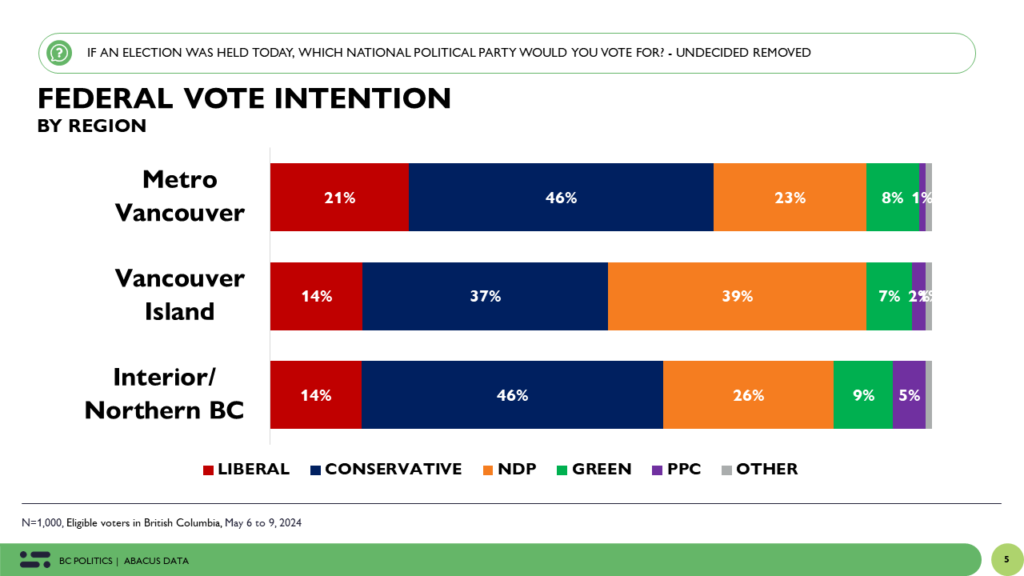
Demographically, the Conservatives are well ahead among men, with 50%. This lead, however, shrinks among women where the support for the Conservatives is only 8 points ahead of the NDP (compared to the 28-point difference among men), and where Liberals are only 7 points ahead of the Greens.
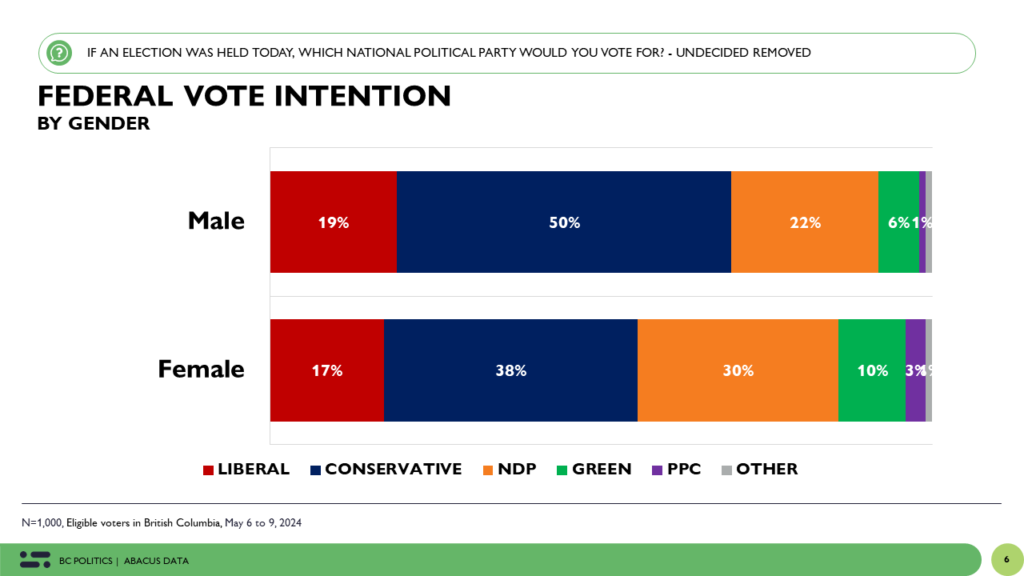
The Conservatives lead across all age groups in BC. They have a 12-point lead among those 18 to 29, a 16-point lead among 30 to 44 year olds, a 17-point lead among 45 to 59 year olds and a 28-point lead among those aged 60+.
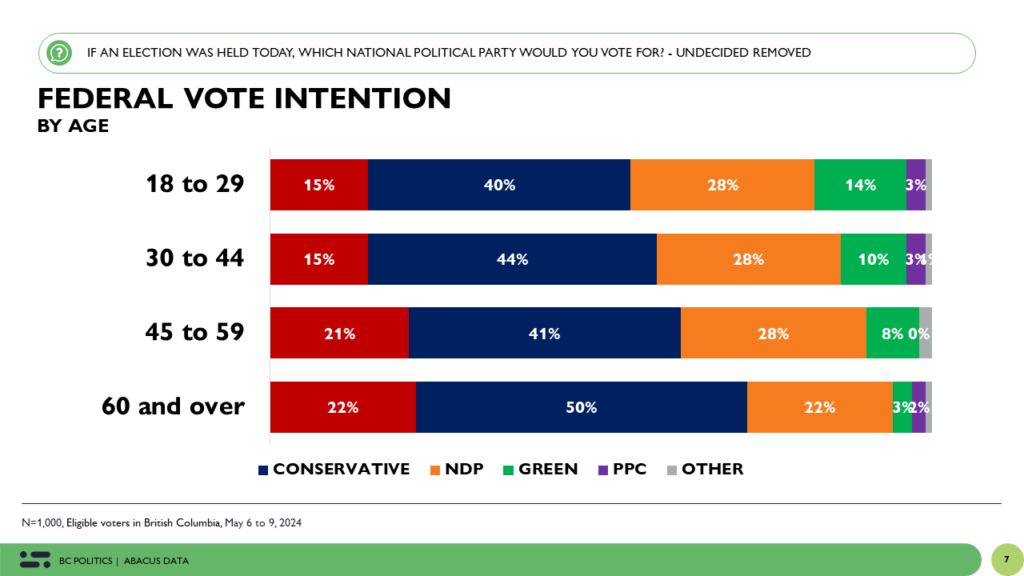
Leader impressions: An unpopular Prime Minister
Support for the Conservatives likely reflects the unpopularity of Prime Minister and Liberal Party Leader, Justin Trudeau. When asked for party leader impressions, Prime Minister Trudeau is by far the most unpopular leader. Among British Columbians, 55% have a negative impression and, conversely, only 22% have a positive impression (the lowest percentage among party leaders), for a net score of -33. This mirrors the latest national average, where 58% have a negative impression of the Prime Minister (for a net score of -34).
In comparison, both the NDP leader Jagmeet Singh and the Conservative Party leader Pierre Poilievre have about equal numbers viewing them favourably and unfavourably. Among British Columbians, 37% have a positive impression of both party leaders, while 30% have a negative impression of NDP Jagmeet Singh and 32% have a negative impression of Conservative Party leader Pierre Poilievre. Notably, Green Party leader, Elizabeth May, enjoys mostly neutral impressions and about equal positive and negative views.
Overall, Jagmeet Singh is the most popular party leader with a net score of +7 while Pierre Poilievre’s is +5. Elizabeth May, who represents a B.C. district, is at +4.
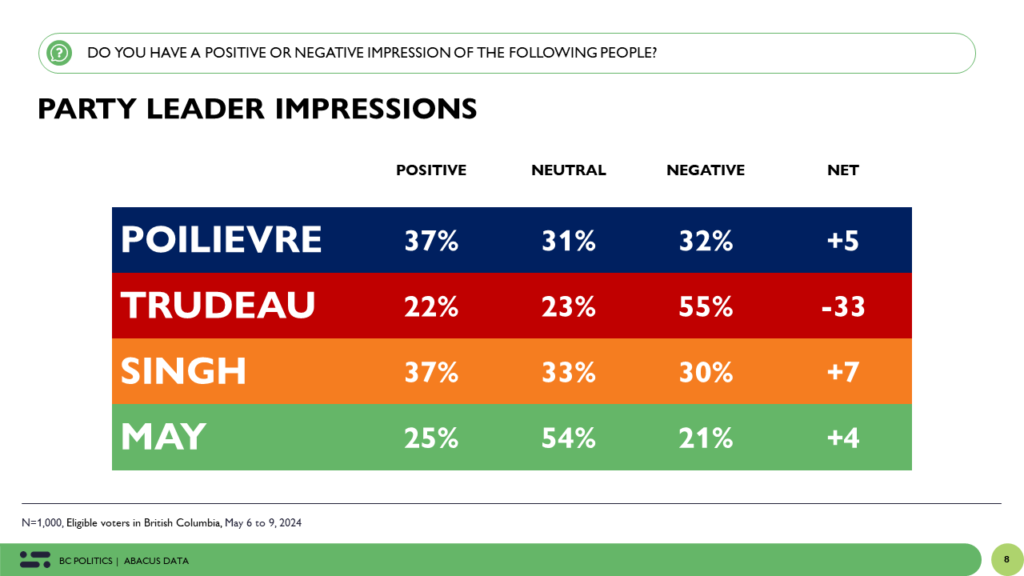
Regionally, negative impressions of Prime Minister Trudeau worsen in Interior/Northern BC, where the Prime Minister is by far the least popular leader with a net score of -40 (60% hold negative views), 6 points below the national average. Similarly in Metro Vancouver and in Vancouver Island, Prime Minister Trudeau has a net score of -34 and -23, respectively.
For reference, both NDP leader Jagmeet Singh and Conservative Party leader Pierre Poilievre have a net score of +2 (31% hold negative views) in Interior/Northern BC. In Metro Vancouver, Conservative Party leader Pierre Poilievre is the most popular leader with a net score of +10, while NDP leader Jagmeet Singh is the most popular party leader in Vancouver Island, where he has a net score of +16.
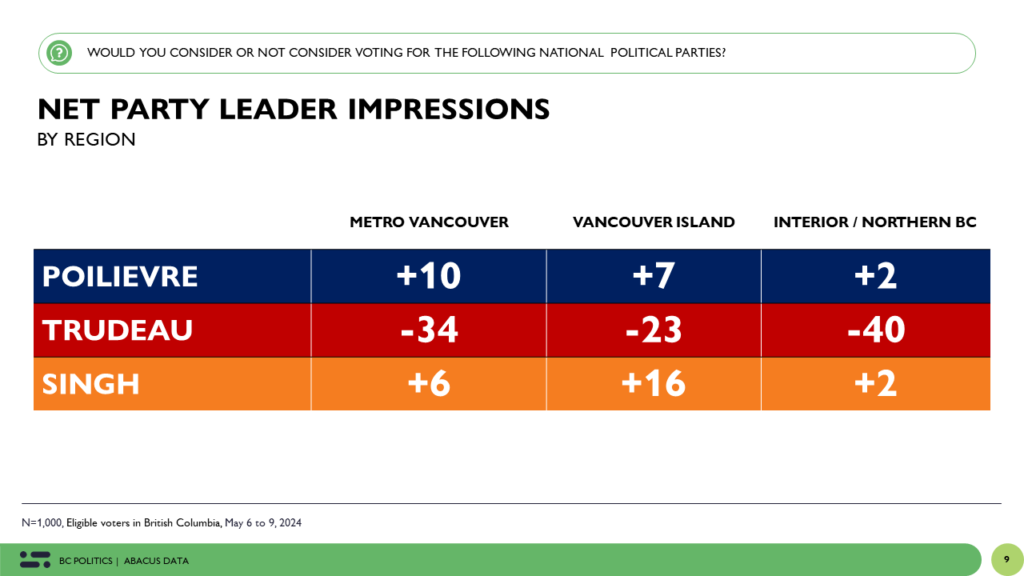
The unpopularity of Prime Minister Justin Trudeau is perhaps most noticeable in the accessible voter pool for the Liberals. When we ask people if they would consider voting for each of the main political parties, 53% say they are open to voting for the Conservatives, 39% for the Liberals, and 51% for the NDP. The Conservatives and the NDP have about equally sized accessible voter pools
For the Liberals the pool of accessible voters is not only smaller than for the Conservatives and the NDP, but 61% of people surveyed said they would not consider voting for the Liberals. This represents the smallest pool of accessible voters for the three major parties, and only 2 points larger than that of the Greens.
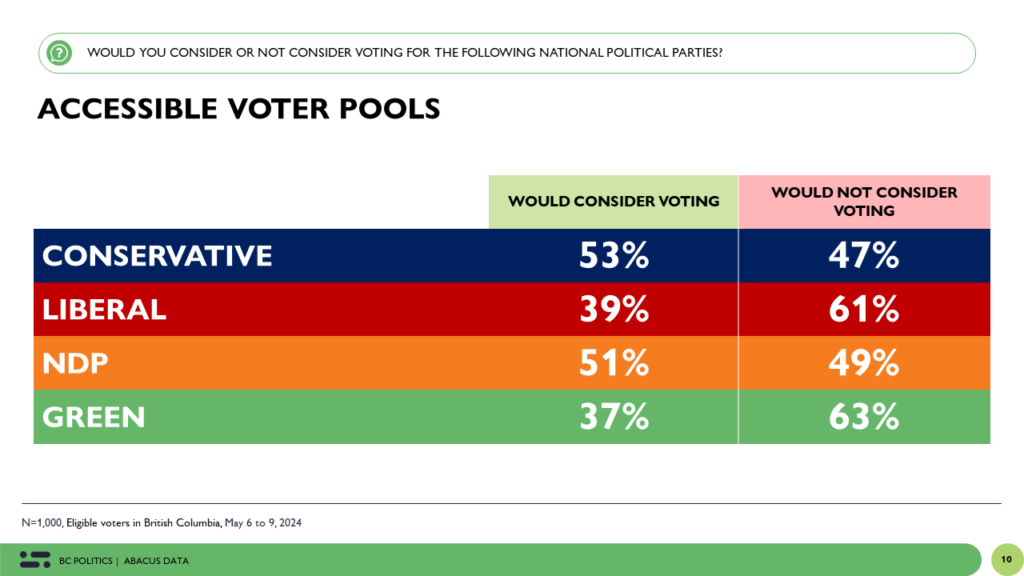
The Upshot
The federal Conservatives are in a strong position, leading in all groups in British Columbia, and mirroring the general popularity of the party across Canada. This is also positive news for the Conservatives in British Columbia, where the party lost 4 seats in the 2021 federal election.
For the NDP, our data show a mixed bag. Among most groups, with the exception of those on Vancouver Island, the NDP trails behind the Conservatives by considerable margins. Across the province support for the NDP is 18-points behind the Conservatives. Impressions of the NDP leader, however, are generally positive. Our latest survey in BC provincial politics found a similar mixed bag, as the NDP remains ahead – and Premier Eby has a net favourable impression – but in a tighter race with the BC Conservatives.
Finally, for the Liberals, who were able to capture the most seats in British Columbia in the 2021 federal election, the results of our latest survey show the party in a challenging position and may be heading to a result more similar to what the party got prior to the Paul Martin years. The Liberals trail behind the NDP among young British Columbians, a key demographic, and among residents of Metro Vancouver, where the Conservatives had previously struggled to find support. Impressions of the Prime Minister are also overly negative, as the Liberals’ accessible voter pool falls below 50%.
Methodology
The survey was conducted with 1,000 eligible voters living in British Columbia from May 6 to 8, 2024. A random sample of panelists were invited to complete the survey from a set of partner panels based on the Lucid exchange platform. These partners are typically double opt-in survey panels, blended to manage out potential skews in the data from a single source.
The margin of error for a comparable probability-based random sample of the same size is +/- 3.1%, 19 times out of 20.
The data were weighted according to census data to ensure that the sample matched BC’s population according to age, gender, educational attainment, and region. Totals may not add up to 100 due to rounding.
This survey was paid for by Abacus Data Inc.
Abacus Data follows the CRIC Public Opinion Research Standards and Disclosure Requirements that can be found here: https://canadianresearchinsightscouncil.ca/standards/
ABOUT ABACUS DATA
We are Canada’s most sought-after, influential, and impactful polling and market research firm. We are hired by many of North America’s most respected and influential brands and organizations.
We use the latest technology, sound science, and deep experience to generate top-flight research-based advice to our clients. We offer global research capacity with a strong focus on customer service, attention to detail, and exceptional value.
And we are growing throughout all parts of Canada and the United States and have capacity for new clients who want high quality research insights with enlightened hospitality.
Our record speaks for itself: we were one of the most accurate pollsters conducting research during the 2021 Canadian election following up on our outstanding record in the 2019, 2015, and 2011 federal elections.
Contact us with any questions.
Find out more about how we can help your organization by downloading our corporate profile and service offering.




